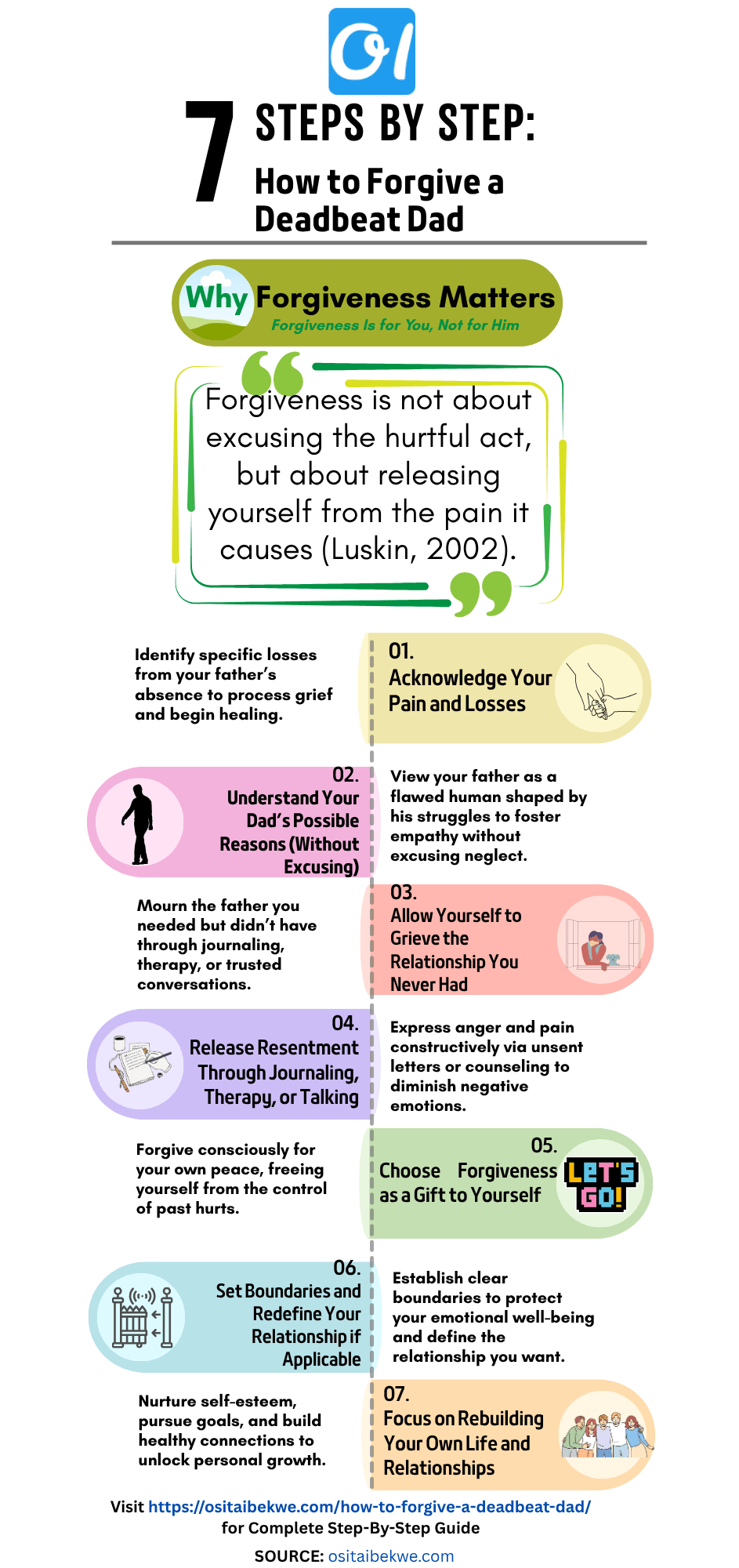Views: 5
A compassionate, step-by-step guide on how to forgive a deadbeat dad and heal the father wound. Learn practical forgiveness steps, expert insights, emotional healing techniques, and resources for reclaiming peace and rebuilding your life.
Table of Contents
- 1 Introduction on How to Forgive a Deadbeat Dad
- 2 Understanding the Deadbeat Dad Phenomenon
- 3 Why Forgiveness Matters
- 4 Psychological and Physical Benefits of Forgiveness
- 5 Key Challenges to Forgiveness
- 6 Step-by-Step Guide to Forgiving Your Deadbeat Dad
- 6.1 Step 1: Acknowledge Your Pain and Losses
- 6.2 Step 2: Understand Your Dad’s Possible Reasons (Without Excusing)
- 6.3 Step 3: Allow Yourself to Grieve the Relationship You Never Had
- 6.4 Step 4: Release Resentment Through Journaling, Therapy, or Talking
- 6.5 Step 5: Choose Forgiveness as a Gift to Yourself
- 6.6 Step 6: Set Boundaries and Redefine Your Relationship if Applicable
- 6.7 Step 7: Focus on Rebuilding Your Own Life and Relationships
- 7 Real-Life Stories & Case Studies
- 8 Additional Resources & Support
- 9 FAQs About How to Forgive a Deadbeat Dad
Introduction on How to Forgive a Deadbeat Dad
Growing up with a deadbeat dad—a father who is physically or emotionally absent—can leave deep emotional wounds. The pain of abandonment, neglect, or emotional absence often reverberates through adulthood, affecting self-worth, relationships, and mental health. Healing from this father wound requires courage, self-compassion, and intentional effort.
RELATED: Deadbeat Dad Quotes
This comprehensive guide explains how to forgive an emotionally absent father, offering practical steps, expert insights, and healing strategies. Whether you’re wrestling with anger, confusion, or grief, this guide will empower you to move beyond resentment and reclaim your emotional freedom.
Forgiveness is not about excusing your dad’s actions or forgetting the past—it’s a gift to yourself, freeing you from the burden of bitterness and allowing you to live fully.
Understanding the Deadbeat Dad Phenomenon
What Does it Mean to Have a Deadbeat Dad?
The term “deadbeat dad” commonly refers to fathers who are absent in their children’s lives due to various reasons such as separation, divorce, incarceration, addiction, or choice. This absence can be:
- Physical absence: Not being present in the child’s life physically.
- Emotional absence: Being physically present but emotionally unavailable or neglectful.
Both forms can cause significant psychological and emotional harm.
Emotional Impact of Father Abandonment
Father absence can deeply impact a child’s emotional development. According to Amato and Keith (1991), children growing up without their fathers are more likely to experience:
- Low self-esteem and feelings of rejection
- Increased risk of depression and anxiety
- Difficulties in trusting others and forming stable relationships
- Higher likelihood of behavioral problems
The U.S. Census Bureau reports that about 19.7 million children in the U.S. live without their father (U.S. Census Bureau, 2023). Worldwide, father absence is a common social issue with lasting consequences.
Why Forgiveness Matters
Forgiveness Is for You, Not for Him
Dr. Fred Luskin, a leading forgiveness expert at Stanford, states:
“Forgiveness is not about excusing the hurtful act, but about releasing yourself from the pain it causes” (Luskin, 2002).
Choosing to forgive your deadbeat dad is primarily an act of self-liberation. It lets you reclaim emotional energy that resentment otherwise drains.
Psychological and Physical Benefits of Forgiveness
Studies have consistently linked forgiveness to improved mental and physical health. A meta-analysis in the Journal of Clinical Psychology (Wade et al., 2020) found that forgiveness interventions:
- Reduce symptoms of depression and anxiety
- Lower stress and blood pressure
- Improve overall well-being and relationships
Forgiveness can serve as a transformative step towards holistic healing.
Key Challenges to Forgiveness
Recognizing Emotional Barriers
The road to forgiveness is rarely straightforward. Common challenges include:
- Persistent Anger and Resentment: These feelings often feel protective but can trap you in pain.
- Shame and Self-Blame: You may wrongly believe your father’s absence is your fault.
- Lack of Closure: Forgiving without apology or explanation can feel incomplete.
- Fear of Vulnerability: Opening up again after emotional wounds may feel risky.
Acknowledging these hurdles helps prepare you mentally and emotionally for the work ahead.
Step-by-Step Guide to Forgiving Your Deadbeat Dad
Step 1: Acknowledge Your Pain and Losses
Identify the specific losses caused by your father’s absence. Go beyond general feelings and specify what you missed, e.g.:
- A father who taught you about life
- A protector during difficult times
- Emotional support and guidance
According to Luskin (2002), this clarity is essential for processing grief and starting healing.
Step 2: Understand Your Dad’s Possible Reasons (Without Excusing)
Try to view your father as a flawed human shaped by his own struggles—be it addiction, trauma, or poor role models. This understanding fosters empathy but doesn’t excuse neglect.
Step 3: Allow Yourself to Grieve the Relationship You Never Had
Grieving is crucial. Recognize that you are mourning the loss of a father you needed but didn’t have. Use journaling, therapy, or trusted conversations to express this grief fully.
Step 4: Release Resentment Through Journaling, Therapy, or Talking
Express your anger and pain constructively. Writing unsent letters to your father or speaking to a counselor can externalize and diminish these emotions.
Step 5: Choose Forgiveness as a Gift to Yourself
Decide consciously to forgive—not for your dad, but for your own peace. Forgiveness means no longer allowing past hurts to control your present.
Step 6: Set Boundaries and Redefine Your Relationship if Applicable
If your father is still part of your life, establish clear boundaries that protect your emotional well-being and define what kind of relationship you want.
Step 7: Focus on Rebuilding Your Own Life and Relationships
Redirect energy into nurturing your self-esteem, pursuing goals, and building healthy connections. Healing the father wound often unlocks personal growth and fulfillment.

Download the 7 Step-by-Step Guide to Forgiving Your Deadbeat Dad
Real-Life Stories & Case Studies
Case Study 1: Healing Through Therapy
Jessica, 32, battled years of anger toward her absent father. Through cognitive behavioral therapy focused on forgiveness, she learned to separate her father’s failings from her self-worth. “Forgiving him didn’t mean forgetting; it meant freeing myself,” she shares.
Case Study 2: Spiritual Forgiveness Journey
David combined therapy with faith-based practices. Prayer and meditation helped him release resentment and find peace independent of his father’s choices.
READ ALSO:
Understanding Deadbeat Dads — Impact, Legalities, and Healing
How to Deal with a Deadbeat Dad Legally: A Step-by-Step Guide to Enforcing Child Support
Healing the Father Wound: A Journey Through Fatherless Daughter Syndrome
Additional Resources & Support
- Therapists specializing in family trauma and forgiveness therapy
- Support groups and online forums for father wound healing
- Books:
- The Forgiveness Project by Marina Cantacuzino
- Forgiveness Is a Choice by Robert Enright
- Exercises: Journaling prompts, forgiveness meditations, and worksheets (available free online)
FAQs About How to Forgive a Deadbeat Dad
| Question | Answer |
| How do I forgive a dad who never apologized? | Forgiveness is about your peace, not his apology. Start by acknowledging your pain and decide to forgive as an act of self-care. Therapy, journaling, or talking to trusted friends can help process emotions without needing an apology. |
| Can I forgive my dad but still be angry? | Yes. Forgiveness is a process and does not mean immediate emotional release. You can still feel anger while working toward peace. Over time, anger usually diminishes as forgiveness deepens. |
| What if my dad was abusive as well as absent? | Forgiveness doesn’t mean condoning abuse. It means releasing your emotional burden and reclaiming your power. Professional therapy is strongly advised to safely navigate trauma and forgiveness. |
| What are the steps to heal from father abandonment? | Steps include acknowledging your pain, understanding your dad’s struggles, grieving, releasing resentment, choosing forgiveness, setting boundaries, and focusing on personal growth. |
| How can journaling help in forgiving a deadbeat dad? | Journaling externalizes feelings, helping clarify emotions and reduce mental clutter. Writing unsent letters to your dad can provide a safe outlet for anger and grief. |
| What is the father wound? | The father wound refers to emotional pain from an absent or neglectful father, affecting self-esteem, relationships, and emotional health. Healing it is essential for well-being. |
| Are there therapeutic approaches to forgiving a deadbeat dad? | Yes. Cognitive behavioral therapy, trauma-informed therapy, and forgiveness therapy offer structured ways to process pain and work toward forgiveness. |
| How does father abandonment affect adult relationships? | It can cause trust issues, fear of abandonment, and difficulty forming healthy emotional bonds. Healing the father wound improves relationship health. |
| What spiritual guidance exists for forgiving absent fathers? | Many faiths emphasize forgiveness as a path to peace. Practices like prayer, meditation, and pastoral counseling can support forgiveness journeys. |
| How do I cope with feelings of rejection from a father? | Validate your feelings, seek therapy or support, and build self-worth independently of your father’s actions. Developing a strong support system helps. |
| Can forgiveness improve mental health? | Yes. Forgiveness reduces depression, anxiety, and stress, promoting emotional and physical wellness. |
| What meditation techniques can help forgive an absent father? | Mindfulness meditation, loving-kindness (metta) meditation, and guided forgiveness meditations help reduce negative emotions and promote compassion. |
| How do I seek closure from an absent father? | Closure often comes from within, through therapy and forgiveness, rather than external validation or apologies. |
| How to rebuild self-esteem after father abandonment? | Practice self-care, pursue personal goals, surround yourself with positive influences, and seek professional support if needed. |
| Are there support groups for healing from father wounds? | Yes. Many online and in-person groups provide community, shared experience, and encouragement for those healing father wounds. |
| What books can help with forgiving a deadbeat dad? | The Forgiveness Project by Marina Cantacuzino and Forgiveness Is a Choice by Robert Enright offer excellent insights and exercises. |
| How long does it take to heal from father abandonment? | Healing time varies per individual and can range from months to years, depending on your support system and healing methods. |
| Can setting boundaries help in forgiving a deadbeat dad? | Absolutely. Healthy boundaries protect your emotional well-being and help define the terms of your relationship or non-relationship. |
| What are some forgiveness exercises for healing father wounds? | Writing forgiveness letters, guided imagery, daily affirmations, and meditation are practical exercises proven to aid forgiveness. |
| How can personal stories aid in the healing process? | Hearing others’ experiences validates your feelings, reduces isolation, and inspires hope that healing is possible. |







